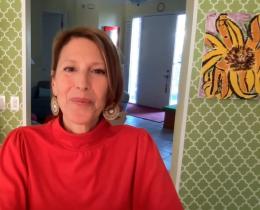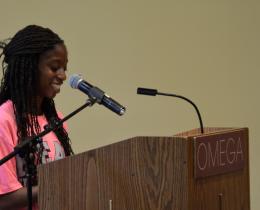Omega: Your book Big Magic is about the creative process. “Stubborn” is a word you evoke to describe your writing practice. But you also “ascend toward stubborn gladness” as a way of being joyful and loving. What is the relationship between discipline and playfulness?
Elizabeth: I'm about to get those two words “stubborn gladness” tattooed on my arm, that’s how important they are to me. They come from my favorite poet Jack Gilbert’s [no relation] lovely poem, "A Brief for the Defense" in which he lays out this incredibly articulate argument for, basically, optimism and good cheer in a world full of sorrows and suffering.
Stubbornness is usually considered negative or really aggressive almost. But optimism and hope come from a kind of deep interior stubbornness as well. Remaining kind despite things going wrong in your life is a kind of stubbornness and being creative is the ultimate stubbornness—because it's so rationally unjustifiable. Why take the time and energy to make something out of nothing for no particular reason? It’s always been a stubbornness that's made me do it, but a good, happy stubbornness. I am determined to make the most of this life that I have, damn it—it's that kind of stubbornness I think we all need more of.
We can't ask anybody's permission to create.
People think of playfulness as what you do in your free time or something childish or lazy. I'm a big fan of taking it seriously with a small “s.” I am vividly against taking it seriously in all caps and block letters. Sometimes people focus so much on the all caps seriousness of their work that they kind of kill it. They kill themselves, they make everyone around them suffer, and they kill the original spark of joy and trickster level play that's at the base of creativity and all human creative impulse.
I have this theory that what's happening in Western culture is that creativity is divided now between the tricksters and the martyrs. The tricksters were the ones who invented it. Creativity just wants to take the known world and flip it upside down and look at it from a different way and that's what tricksters do. It's all done in play, but play that changes the universe.
Art has been hijacked the last few centuries by the martyr. This heavy energy of, “I will do this at all costs.” I've never seen any good come out of anything in the world that people didn't work for, but that work doesn't have to be heavy and grim and self-aggrandizing. I know that work can be stubbornly glad.
Omega: You advise to write every piece to one particular person. You wrote Signature of All Things to your fourth-grade teacher Sandy Carpenter, a vibrant feminist. Who did you write Big Magic to?
Elizabeth: There's who you write something to and there's who you write something for. I wrote it to an aspiring young writer. We went out to lunch about a year and a half ago. She was in such despair, she was 26 and feeling like it's already too late and that she hasn't made anything yet. There was so much creativity and so much imagination but no play, no light. I basically wrote the book as a letter to her. I was delighted to be able to send it to her and say it was our conversation that day at lunch that made me finally sit down and do this.
But I also wrote it for, and dedicated it to, my best friend Rayya Elias, who embodies stubborn gladness. She was born in Syria, raised in Detroit, and is a punk rock, lesbian, tattooed, motorcycle-riding, pit bull-owning, bad-ass. She’s the author of a book called Harley Loco and she's spent her entire life making stuff—making music, movies, art, writing books, and has never had cataclysmic world-shaking success but has never stopped and has always been willing to do all sorts of stuff on the side. We did this event recently where I said to her, "Can you speak about that idea of when it's too late to begin?" She just looked at the audience and she said, "Are you dead? No, then f***in' create something."
So I wrote the book to one person who needs to embody a different spirit about creativity and another person who already does embody that spirit.
Omega: The notion of the tortured artist is one you dispel emphatically. In your TED talk, you describe a masculine language of domination and submission. How do you think women deal uniquely with pain and fear around creativity?
Elizabeth: There’s nothing more creative than a woman's body. Although oftentimes that's been a limitation because women are told, “You don't need to make anything, you make life.” And women are like, “Gee thanks. I'm grateful to be making life, but that's not the only thing I want to make. There are [actually] many ways to make life.”
In my experience talking to a lot of women over the years about creativity, women have a different obstacle. They have deep unworthiness. Men have that as well, they express it in self-destruction and destruction of others. But women have this question of whether they're even allowed at the table.
What I find myself speaking out about a lot is trying to convince women to join the cultural creative conversation at all. There are many reasons women's voices and visions are not as widely represented in creative fields as they should be, and a lot of that is due to just regular, old, garden-variety misogyny. But a lot of it is women not making the work in the first place, cutting themselves out of the conversation before the conversation even begins. Or, if they make it, not sharing it. Or if they share it, not going back after they were rejected the first time and trying again.
I completely understand that comes from centuries of a billion messages telling you that you are second-rate and that you should really shut up and it's hard to overcome. Yet we must. We can't ask anybody's permission to create. We can't go to people and ask for their approval or their blessing; we have to simply do it.




